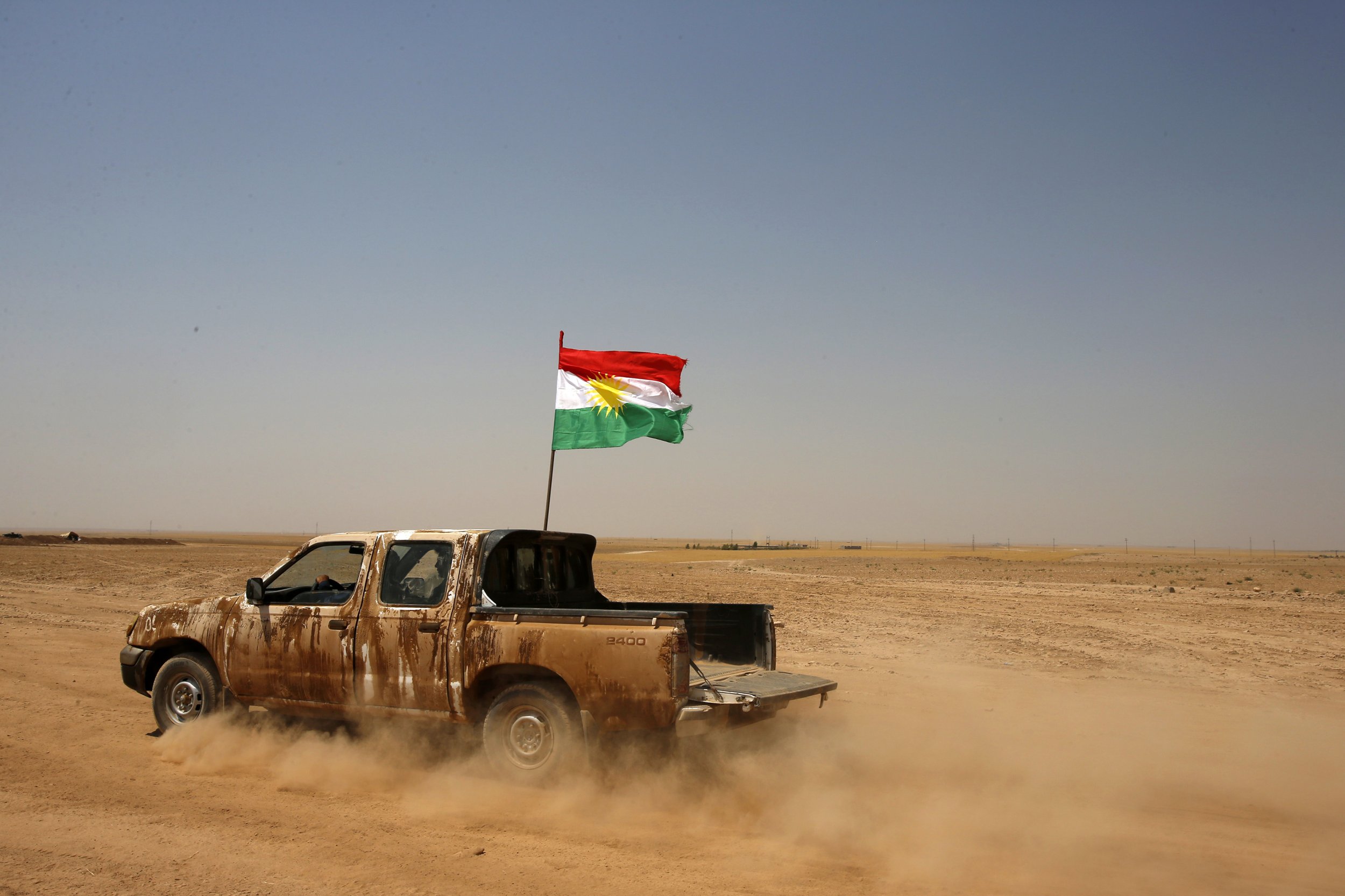
When, in August 2014, the Islamic State—or ISIS—began to advance into Kurdish territory in northern Iraq to threaten the Kurds' regional capital of Erbil, it forced U.S. President Barack Obama back into Iraq to protect the Kurdish enclave. Backed by U.S. airpower, and through the prism of the war on ISIS, Kurdish leaders have advanced their aspirations for an independent state. Kurdish leaders say independence would finally free their people from the shackles of a fabricated state fused together by Western powers in the aftermath of the First World War.
In their fight against ISIS militants over the last sixteen months, Kurds have lost territorial contact with Iraq—the region now shares just a 30-mile stretch of border with Iraqi forces and over 500 miles with ISIS-controlled territory—and their political representation in the federal government in Baghdad today is largely ceremonial. To date the Kurds have reclaimed over 8,000 square miles from ISIS, including November's significant victory in Sinjar.
The emergence of Kurdish sovereignty was reinforced in October 2014 when 156 Kurdish fighters, known as the Peshmerga, crossed from Turkey into the northern Syrian town of Kobane to fight off an ISIS offensive. As Turkish leaders celebrated their Republican Day Kurds flocked to salute the Peshmerga in scenes that invigorated Kurdish nationalism. The symbolic victory in Kobane later led to increased U.S. military engagement in Syria.
The Peshmerga have proved to be the main ally and ground force for the U.S.-led international coalition fighting ISIS jihadists. The coalition is supplying them with arms but Kurdish President Masoud Barzani says his fighters are not receiving enough for the war. Given Iraq's opposition to arming the Peshmerga, all shipments are inspected in Baghdad prior to arriving in Erbil, further delaying vital military and humanitarian aid.
When six Iraqi military divisions collapsed in and around Mosul—Iraq's second largest city—in the face of the ISIS advance, thousands of additional Peshmerga were deployed to the oil-rich city of Kirkuk to fill the vacuum and seize its abandoned oil fields. Retaking Kirkuk—heavily contested by Kurds and Arabs—without a shot fired would previously have been described only as a pipe dream for Kurds. In a matter of weeks, the oil fields were connected to an independent pipeline to Turkey to finance the newborn state. Today the region exports over 600,000 barrels per day beyond Baghdad's reach.
Baghdad suspended the Kurds' share of federal revenues in a futile attempt to thwart their ambitions and coerce a compromise. The Kurds believe, however, that direct oil sales are required to tackle growing debts, finance the war on ISIS and give shelter to over 1.6 million displaced Iraqis—mostly Sunni Arabs who fled from ISIS — and about 250,000 Syrian refugees.
Beyond its oil sales and strengthening army, the regional government also possesses a rare foreign policy that is more in tune with the West and its allies than is Baghdad. Like the U.S., the Kurds have called on Syrian dictator Bashar al-Assad to go and have also trained some 6,000 Syrian Kurds to protect their areas in Syria. The central government, however, is sharing intelligence with Syria. Kurds' foreign policy has gained traction with Western allies in the Middle East and is why today Erbil enjoys better diplomatic ties with regional states, including Turkey and Saudi Arabia, than Baghdad does. This policy has also attracted significant commercial interests, particularly in the region's rich oil and gas deposits.
Because the Kurds are landlocked they will need agreements with their neighbors to succeed. In the long run, Turkey will acquiesce to a Kurdish state by substituting its gas imports from Russia with guaranteed cheap Kurdish oil and gas supplies; Iran will eventually recognize that it's in their interest to have a Shia supermajority in Iraq; and without a domestic Kurdish problem Iraq will likely be a peaceful and prosperous neighbor for Kurdistan.
Kurdish aspirations have long exasperated not only Baghdad but ordinary Iraqis who accuse Kurds of developing a state at the expense of Iraqi resources. In absence of trust, both parties are reluctant to budge; Baghdad wants the Kurds to surrender their rights while Kurds—having achieved economic independence—see little incentive in return.
Now is the time to begin formal talks by setting a three-year deadline to settle differences and finalize an amicable divorce from Iraq. With strong support from the West, Kurdistan can remain a beacon for stability and tolerance and a bulwark against terrorism in the Middle East.
The Kurds have already carved out their state from the ruins of Iraq. All that stands in the way is a formal announcement.
Aziz Ahmad is based in Erbil. Follow him on Twitter at: @azizkahmad
Uncommon Knowledge
Newsweek is committed to challenging conventional wisdom and finding connections in the search for common ground.
Newsweek is committed to challenging conventional wisdom and finding connections in the search for common ground.
About the writer
To read how Newsweek uses AI as a newsroom tool, Click here.








